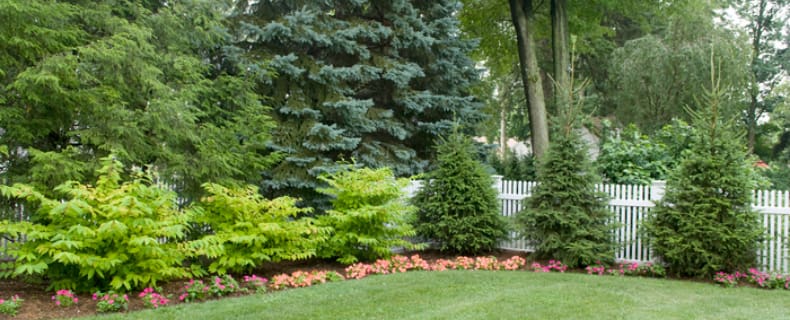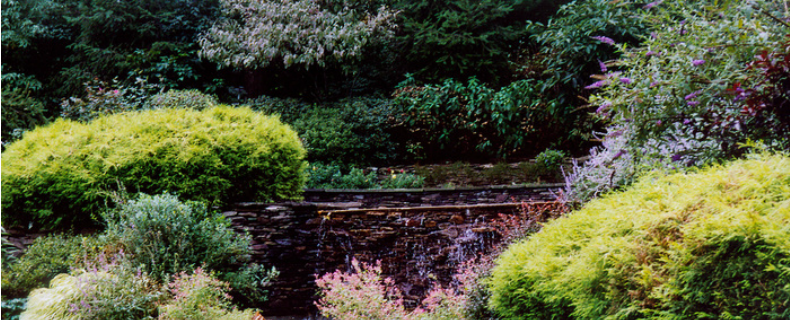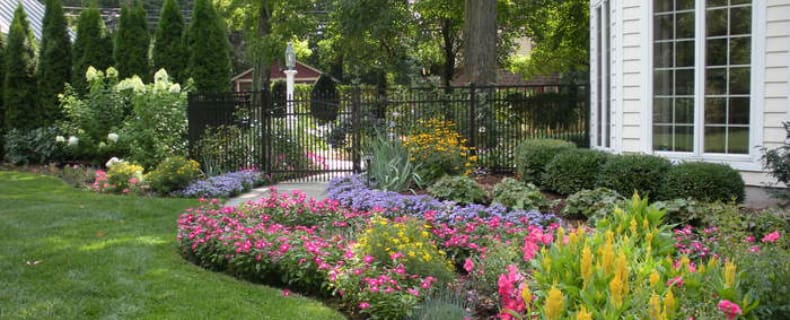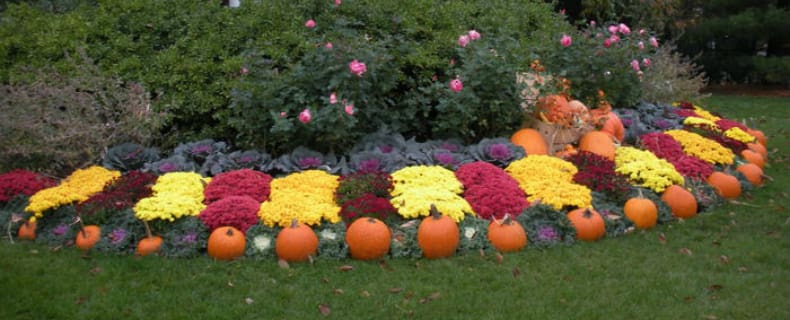Regular year-round lawn care and maintenance is essential for a green, healthy lawn. Without it, your grass can become overgrown and more susceptible to all types of lawn diseases and outdoor pests. Seasonal lawn care and maintenance requirements change as temperatures rise and fall, so it’s important to pay attention to the time of year for proper care. Here’s a helpful guide on how to take care of your lawn year-round in Northern NJ.
Spring Lawn Care
The spring season is the busiest time of year for your lawn care. Spring weather brings welcome sunshine and rainfall for your lawn and landscape plants. It’s a major growth season when your grass grows at a faster pace, flowers and plants produce colorful new blooms, and trees and shrubs produce new green leaves. After a cold Bergen County winter, your lawn needs important care and maintenance to grow healthy and strong. During spring, it’s important to focus on regular maintenance, feeding, weeding, and pest controls to ensure a lush, green lawn.

Regular Lawn Care and Maintenance
In the spring, everything in your landscape is growing at a faster rate to produce abundant new growth. Regular lawn care and maintenance is essential to prevent overgrowth and weeds. For best results, hire a professional lawn care company that knows how to take care of your lawn year round. Typical services include weekly care and maintenance:
- Lawn mowing
- Weeding
- Border edging for sidewalks, walkways and driveways
- Cleaning of hard surfaces like walkways and driveways
- Spring yard cleanup of dead winter growth and debris
- Fall yard cleanup and preparation for winter
Feeding
After cold winter temperatures, your grass and plants need essential nutrients for healthy new growth in the spring. Freezing winter weather depletes important nutrients. For best results, choose a light, slow-release, or organic type fertilizer that won’t burn your lawn. Instead of typical granular fertilizers, liquid feeds and tonics can also be applied. A lawn care professional can choose the best type of fertilizer for your grass and create a fertilization schedule for proper care on how to take care of your lawn year-round.
Weeding
New spring growth also encourages weed growth in your lawn. It’s important to apply a pre-emergent herbicide to your lawn in early spring as part of your lawn care regimen to prevent weed growth before it takes hold. Aggressive weeds like thatch, dandelions and crabgrass will invade your lawn quickly without proper weed control. In late spring, apply a post-emergent herbicide to control broadleaf and grassy weeds that show up in the summer.
Insects and Pests
Along with warm weather come insects and outdoor pests that invade your lawn and landscape. They love to eat fresh, new growth that’s abundant in the spring. In March, talk to a Bergen County landscape professional about how to take care of your lawn year-round with proper pest control. An Integrated Pest Management Program (IPM) that focuses on organic lawn care is an excellent solution for year-round pest control.
Organic Lawn Care
Organic lawn care is a great way to provide a safe chemical-free environment for your home. It promotes green living and protects the environment from chemicals and toxic fumes. Organic lawn care helps to establish a natural, balanced ecosystem with natural, organic solutions. It’s a healthy way to promote strong root growth, plant stability and protection from lawn diseases and outdoor pests. For best results, organic landscape care and maintenance should include Spring, Summer and Fall applications.

Summer Lawn Care
The summer season brings hot sun, dry heat, and less rainfall, so regular care and maintenance are essential to protect your lawn. Bergen County has warm, humid summers with average temperatures from 75 to 85 degrees Fahrenheit. During the summer, it’s important to focus on regular lawn mowing, watering, and pest control.
Regular Lawn Mowing
Like in spring, grass will grow faster during the summer months, so weekly mowing is essential to prevent overgrowth and keep your lawn well-maintained. If your grass gets overgrown, your lawn is much more susceptible to lawn diseases and outdoor pests that can damage your lawn. Weekly lawn mowing is advised during the summer season. For mowing concerns and questions on how to take care of your lawn year-round, talk to a lawn professional about regular lawn care and maintenance for your home.
Watering
As a general rule, your lawn needs one inch of water every week for proper lawn care. It can come from rainfall or an irrigation system, but it’s absolutely necessary for healthy, green grass. When watering, deep and infrequent watering is better than frequent, short sprinkler applications. Deep watering promotes stronger, deeper root systems that can reach farther underground for necessary water during hot weather. Quick, shallow watering allows the soil to dry out much faster. However over-watering contributes to fungal growth and lawn diseases.
Insects and Pests
In June, watch for sod webworms, the larvae of lawn moths. In July, watch out for grub worms, the larvae of June and Japanese Beetles, that like to feed on healthy grassroots. Grub worms will cause a scorched grass appearance and loose sod that you can easily lift up. If you suspect grub worms, pull back the sod and look for white, C-shaped worms. Grub worms, aphids, caterpillars, chinch bugs, red and carpenter ants, ticks, and fleas are common outdoor pests found in Northern NJ areas. Talk to a lawn care professional about how to take care of your lawn year-round with proper pest control.
Mulching
Mulching is a simple, inexpensive way to provide great lawn care benefits. It provides a protective layer of material on top of the soil that helps to retain soil moisture and prevent weed growth during the summer season. Organic mulches like straw, grass clippings, and bark chips decompose naturally and help to improve soil conditions by adding organic matter back into the soil. Inorganic mulches don’t improve soil conditions, but they do offer advantages for steep slopes, hard-to-water areas, and soil erosion. Mulching around flower gardens, shrubs and trees will give your landscape a neat, well-maintained appearance.

Fall Lawn Care
During the fall season, it’s important to prepare your lawn for upcoming winter weather. As cooler temperatures arrive in Northern NJ, grass and plant growth will begin to decline and eventually go dormant. Your grass is still growing, just at a slower rate. During the fall you should focus on cleaning up your yard, feeding, planting new grass, and aerating your lawn. Continue with weekly lawn care and maintenance to prevent overgrowth and keep your lawn’s appearance well-maintained.
Fall Yard Cleanup
To prepare for winter, clean up your lawn and landscape before cold weather arrives. During the fall season, dead or weak tree limbs and branches may fall off in your yard. Autumn leaves will begin to fall and cover your lawn. It’s important to rake up dead and wet leaves, get rid of any debris and deadhead plants before winter. Anything left on your lawn can smother your grass and cause dead or bare spots in your lawn.
Feeding
Although March is the most important month to fertilize your lawn, September or October fertilization will help protect your lawn and plants during cold New Jersey winters. Adding fertilizer in early fall will help your grass store essential nutrients during the winter months when they get depleted. Cool-season grasses, most common in Northern NJ lawns, need a complete fertilizer as opposed to one that’s only high in nitrogen. Potassium, a key ingredient in fall feedings, encourages strong growth, so your grass can survive through the winter. Talk to a lawn care professional about the benefits of fall fertilization and feeding tips on how to take care of your lawn year-round.
Planting New Grass
If you want to re-seed or plant new sod, late summer or early fall is the best time. In September, temperatures are beginning to cool down slightly, and it’s important to seed or sod before winter. Cool-season grasses found in Northern NJ, like perennial ryegrass, wheat grass, bluegrass, and fine and tall fescue, germinate best when daytime temperatures are below 70 degrees and soil temperatures range from 55 to 65 degrees Fahrenheit.
Removing Thatch
In the fall, you can use a spring-tined rake or a mechanical scarifier to remove thatch that has built up in your lawn. Scarify in two directions, making the second pass deeper and more vigorous than the first pass. You can rake up the removed thatch and discard it or add it to your compost pile.
Aerating Your Lawn
Aerating your lawn in the fall will prevent soil compaction in the winter when the ground freezes. Lawn aeration, punching small holes in the soil, allows soil and grassroots to get and store needed oxygen, water, and fertilizer through the winter months. The lawn should be spiked down to about four inches with either a fork or a mechanical aerator. For best results, contact a lawn care professional with proper aeration knowledge, skill, and proper equipment. Since most soils don’t provide proper nutrients, drainage, or airflow, aerating your lawn will promote healthier soil and stronger, thicker grass throughout the year. Ask your lawn care professional about how to take care of your lawn year-round with proper lawn aeration techniques. Solid tining should be done every year, and about every three or four years hollow tining can be performed instead.

Winter Lawn Care
Although your grass may look a little browner in the winter, it still needs regular care and maintenance to survive through cold weather and produce new, green growth in the spring. Although the winter season requires a little less lawn care, you don’t want to ignore your lawn. Focus on winter yard cleanup, continued regular lawn care and maintenance, and protecting your grass. Ask your lawn care professional for winter lawn care advice and how to take care of your lawn year-round.
Winter Yard Cleanup
During harsh Bergen County winters, your lawn can collect fallen tree limbs and branches, twigs, and debris from heavy rainstorms and high winds. Any debris that’s left on your lawn too long can cause dead spots in your grass, especially during a snowfall when your grass lacks oxygen. It’s important to remove all lawn debris, rake up leaves and keep your property well-maintained.
Regular Lawn Care and Maintenance
Although your lawn, plants, shrubs, and trees all grow much slower during the winter, regular weekly maintenance is essential to avoid overgrowth, weeds, and outdoor pests. Tallgrass leaves your lawn susceptible to a variety of harmful insects and outdoor pests. Overgrowth makes a nice, warm home during the winter for field mice, rats, gophers, moles, possums, raccoons, rats, and snakes that can destroy your lawn and create possible dangers for small children and pets. Talk to a qualified, Bergen County lawn professional about how to take care of your lawn year-round with proper winter lawn care and maintenance.
Minimize Foot Traffic
Although grass is naturally resilient, cold winter temperatures put extra stress on plant roots. Cool-season grasses, common in Northern NJ lawns, usually turn brown and go dormant during the winter. With proper care and fertilization, they turn green again when spring arrives. Excessive winter foot traffic on your lawn will weaken your grass and make it harder for your lawn to recover in the spring.
In addition to regular weekly lawn service, a professional lawn care company can perform other services to keep your property beautiful and healthy throughout the year. These services typically include:
- Lawn renovations
- Garden design
- Seasonal planting of flowers and small plants
- Pruning of ornamental shrubs and trees
- Holiday lighting and decor
- Landscape lighting
Talk to a Bergen County landscape company about how to take care of your lawn year-round and other important lawn care services for your home.

